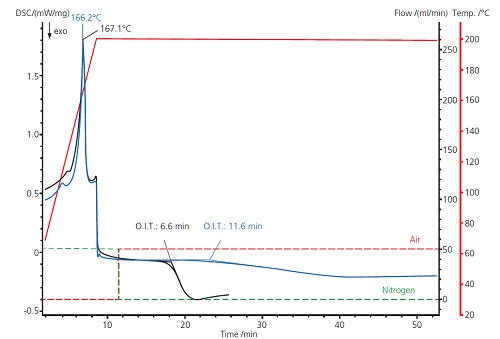Polymères
Contrôle qualité des polymères par DSC – Stabilité à l’oxydation
Les tests Oxidative-Induction Time (OIT) and Oxidative-Onset Temperature (OOT)Oxidative Induction Time (isothermal OIT) is a relative measure of the resistance of a (stabilized) material to oxidative decomposition. Oxidative-Induction Temperature (dynamic OIT) or Oxidative-Onset Temperature (OOT) is a relative measure of the resistance of a (stabilized) material to oxidative decomposition.OIT (temps d’oxydation induit) sont bien connus pour évaluer la résistance à l’oxydation des polymères, en particulier les polyoléfines.
Dans cet exemple, deux échantillons de PP sont chauffés jusqu’à 200°C sous atmosphère dynamique d’azote. Le pic EndothermiqueA sample transition or a reaction is endothermic if heat is needed for the conversion.endothermique détecté durant la chauffe correspond à la fusion du polypropylène. Après 3 minutes à 200°C, le gaz est remplacé par de l’air. L’effet ExothermiqueA sample transition or a reaction is exothermic if heat is generated.exothermique résultant indique la dégradation du polymère.
Dans ce cas présent, l’oxydation se produit plus tôt pour l’échantillon A que pour l’échantillon B (Oxidative-Induction Time (OIT) and Oxidative-Onset Temperature (OOT)Oxidative Induction Time (isothermal OIT) is a relative measure of the resistance of a (stabilized) material to oxidative decomposition. Oxidative-Induction Temperature (dynamic OIT) or Oxidative-Onset Temperature (OOT) is a relative measure of the resistance of a (stabilized) material to oxidative decomposition.OIT 6.6 min vs. 11.6 min).
